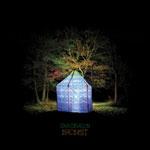
Dan Deacon Bromst
(Carpark)
This same principal applies in music. When Dan Deacon's first record came out in the summer of 2007, I originally claimed it was silly, fun music for silly, fun people. Since then, however, my view has shifted and distorted the album into some kind of electronica classic, a high water mark for the genre and as essential an album as The Blue Album, The Lonesome Crowded West or Doolittle. I look at that album now less as a fun record of goofy experiments and more as serious art that strives to push forward. By looking back through rose-colored glasses, I've forgotten what attracted me to that album in the first place, the fact that it was fun, easily accessible electronica for anyone with a pair of dancing shoes and a sense of humor.
Time is fucking me again. It's been two months since Bromst was released and odds are good that if you are reading this website you have already formed an opinion on the album. The record has received tons of positive press, and the general take on it is that it is a big step forward for Deacon, one that establishes him as a serious, mature artist. As if there was something wrong with making music with a sense of humor in the first place.
And so, we have Bromst, an album that does indeed show signs of Deacon taking his music seriously, but at the expense of what initially made him great. His skills as an arranger and sequencer are as strong as ever. The album's opener Build Voice is a prime example of this, almost as if the track is nothing more than a warm up exercise for the rest of the album. The slow fade in of theme, the addition of melody, the development and exposition, the breakdown, the final crescendo: the track is a blue print, a note to other, lesser artists explaining "This is how it is done, this is the way the pros do it." The track itself isn't nearly as interesting as what it seems to say.
In an effort to grow up his sound, Deacon has introduced new noises to his normal pallet of 8-bit video game midis and Saturday morning cartoon blasts of colorful notes. Bells, horns and unaltered human voices are just some of the new, more mainstream effects that he uses to create his music.
Of course, calling Deacon mainstream is like calling the Mojave desert a nice summer vacation spot. He still deals in spastic burts of fuzzed out dance music with a manic communal feel, but the fun doesn't come as easily this time around. Red F, Padding Ghost, Woof Woof, and Get Older all strive for that Spiderman of the Rings feel. Only Woof Woof, with its barking dog samples, achieves the same level of exuberance. Baltihorse and Suprise Stefani find him taking a shot a slower, more restrained songwriting, and though these tracks do eventually grow after repeat listens, casual fans may not stick around long enough to be drawn in.
While the album lacks a powerhouse number like Spiderman's Wham City, Bromst boasts two of Deacon's finest tracks in Snookerd and Of The Mountains. The songs are placed next to each other on the album, and they embody every good thing that he does. They are layered and arranged beautifully, each song working together to create a 15+ minute anthem that rises, falls, swells and sways with a weight and beauty that modern pop music so rarely achieves. Classically arranged, professionally rendered and lovingly created, these two songs are as close to symphony as any electronica artist has ever come, and stand as his finest work to date.
It is in moments like the final chorus of Snookerd, or in the whistle-lead breakdown during Of The Mountains that maturity looks best on Deacon. Those moments show that when he puts his mind to it, he can advance his music while retaining the sense of fun that made him such a hit in the first place. Bromst is not as immediately enjoyable as its predecessor, but that's OK. He is out to be your new favorite artist, not just some flash in the pan.
Time fucks with everyone, and I am sure I will look back at this album differently two years from now, but right now, Bromst is an excellent followup to a slightly more-excellent debut, and proof that Deacon isn't going anywhere.
2 June, 2009 - 20:10 — Nate Adams